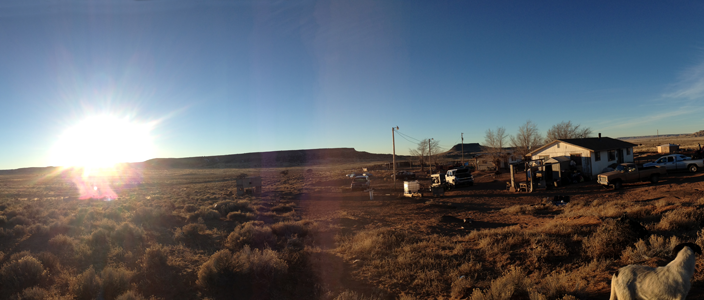There are four sacred mountains that outline the traditional Navajo homeland, and inside is where all your blessings are, where all life started. You’re only supposed to perform traditional ceremonies within the boundaries. For example, a baby’s umbilical cord is often buried in the ground. Mine is buried in the horse corral at my maternal grandmother’s house. My mom said it’s done so that I will always return to my people and care for the animals and Earth.
Maybe it’s the history of strong women that makes me feel so strongly I need to take care of the land. In our matriarchal society, women own the land, and I interpret that to mean that the women usually will outlive the men. All my grandmothers have outlived my grandfathers. As a woman, you’re supposed to have the strength to live without your spouse and still take care of your children and the land. Navajo Nation is not just an Indian reservation where people were forced to move. It’s our sacred denétah, or Navajo homeland, and you’re supposed to take care of it.
I’m from the Window Rock area, a community that was named after its massive rock formation that has a big hole in it, like a window to the sky. It’s a very rural community, and there’s not much to do. There are no movie theaters or bowling alleys or skating rinks. There are a few gas stations and restaurants, little shops, a motel, and the tribal zoo. The closest big store is a Walmart in Gallup, New Mexico, about thirty miles away. I heard it’s one of the top-selling Walmarts in the country because everyone from Navajo Nation goes there. The reservation is basically a food desert because we don’t have access to fresh and healthy foods, and when we do, it’s too pricey for most people.
The Long Walk is a very important part of my tribe’s history. The shock of having your whole way of life changed has kind of trickled down through the generations. There’s a lot of drinking, depression, teenage pregnancies, and unemployment on the reservation. Not everyone has a problem with alcoholism, but I know a lot of people who started drinking in seventh or sixth grade and who still drink now.
On the reservation, a lot of people are into the Western lifestyle. My dad has raised horses all his life, and he competes in roping competitions. The horse is considered a sacred animal in Navajo culture. When someone passes away, some families will shoot the person’s horse so the person will have a horse to ride in the spirit world. They did that for my paternal grandfather when he passed away last summer.
Basketball is also big on the reservation. I’m pretty sure the Window Rock high-school gym is as big as Cameron.
In the summers we would go camping, horseback riding, and yaani hunting. Yaanis are kind of like people who’ve sold their souls to evil magic and who go around cursing people. You’d drive out to the middle of nowhere, park your car, and someone would do the yaani call (you cup your hands together and cross your thumbs and then you blow through the little space to make a whistle). Then you’d just wait there and listen for the littlest sound. People would get really freaked out.
At Duke, I miss all the open space on the reservation. I remember when I first got here, flying over Durham and seeing all the trees. I didn’t like how you couldn’t see the skyline. Even now I’m really not sure which way is east or west, because I’ve never seen the sun rise or set. It really has a cultural importance, because you’re supposed to pray at the sunrise.
As told to Elizabeth Van Brocklin.
Sam June is full Navajo, and she is one of the few Duke students who has grown up on a rural Native-American reservation. A rising sophomore, she is from St. Michaels, Arizona, which is close to Window Rock, the tribal capital of the Navajo Nation. She plans to major in environmental science and policy and ultimately devote her life to the protection of the Navajo land and people.


Share your comments
Have an account?
Sign in to commentNo Account?
Email the editor